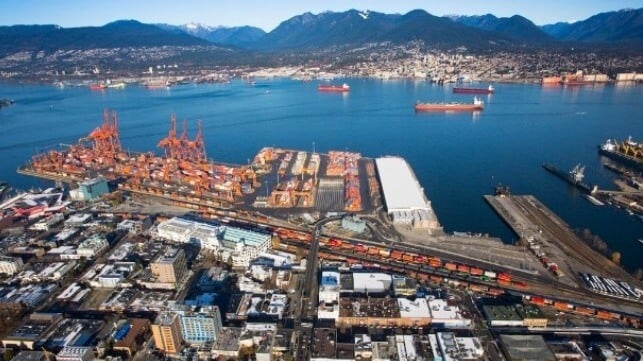Canadian West Coast Ports Set to Stop Work as Union Lockout Begins

Employers at Canada’s West Coast cargo ports confirmed they will be proceeding with the lockout of union members from the International Longshore and Wharehouse Union Ship & Dock Foreman Local 514 starting on Monday afternoon, November 4. All container and general cargo operations will be coming to a halt although grain exports and cruise operations (which are out of season) are excluded from the current job action.
Union members reported to work for the morning shift on Monday while announcing they were starting a limited strike action. The approximately 700 foremen overseeing operations in ports including Canada’s largest port, Vancouver, and the third larger, Prince Rupert, said they would be refusing overtime assignments as part of the ongoing struggle to reach a new contract with the BC Maritime Employers Association. The previous contract expired on March 31, 2023.
The foremen were following a similar tactic taken by the Canadian East Coast longshore union which began rejecting overtime nearly a month ago at the Port of Montreal in its contract dispute. Montreal warned of disruptions but continued to operate, while the West Coast employers said the lockout would be a defensive action because the limited action was unpredictable and could easily escalate.
The West Coast union responded saying the employers were “grossly overreacting,” to the limited action. The union emphasized that members reported as normal for the morning shift at 0800 this morning.
BCMEA announced that it would begin the lockout at 1630 this afternoon as the afternoon shift was due to report. They said all activity across the province would be impacted while also saying that their “final offer” remained open to the union.
Shippers have reportedly been scrambling to deal with the anticipated disruptions. The Greater Vancouver Board of Trade reported that C$800 million (US$575 million) of trade flows through the West Coast ports and that the action would cause widespread disruptions. Reports are saying auto parts supplies were likely to be among the most impacted although clothing, footwear, chemicals, and lumber are all going to be impacted.
The current action is limited to the foreman but in 2023 the longshore workers went on strike for 13 days. Analysts commented that it took up to three months to recover from last year’s strike with containers delayed anywhere from 39 to 66 days.
Port of Vancouver has reported strong growth in 2024 with volumes up 14 percent to over 1.8 million TEU in the first six months of the year. Loaded imports were just under 1 million TEU in the first half of the year while over 410,000 export containers were also moved.
U.S. business leaders are also expressing concern because up to 20 percent of the volume is reported to be cross-border trade into the U.S. Some of the traffic is expected to divert into the U.S. ports.
Canada’s Labor Minister Steven MacKinnon had proposed a special mediation program after labor regulators ruled that the local had bargained in bad faith aware of the coming automation steps without putting forward proposals for over a year. MacKinnon said over the weekend that he was in touch with both sides and repeated that federal mediators were standing by to assist in new negotiations.

that matters most
Get the latest maritime news delivered to your inbox daily.
The West Coast action comes as negotiations are also reportedly stalled in Montreal for a new dockworker contract. The union extended the overtime strike to include a total stop at two container terminals which are reported to handle 40 percent of the port’s cargo volumes. The terminals have a contract to service MSC Mediterranean Shipping Company vessels.
Both unions are focused on life-work issues and manning and scheduling issues. While wage increases are part of the demands, automation and its impact on the workflow have emerged as the sticking point. In Vancouver, DP World moved ahead with new remotely controlled cranes which have become the focus of the labor dispute. The local had previously called for a strike focused on DP World. The local’s strike mandate was due to expire meaning it would have started a new membership vote.
